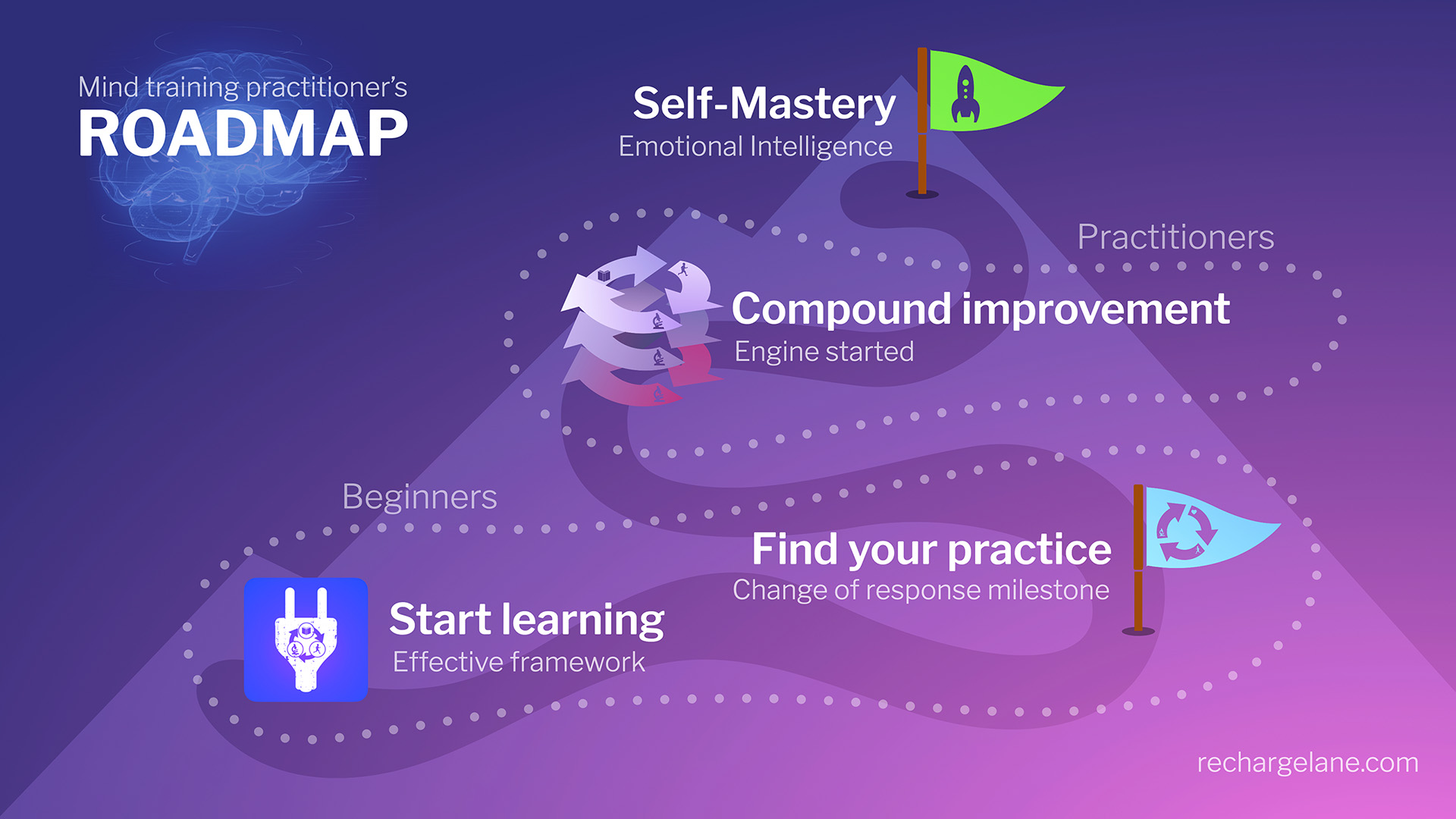
What is self-mastery?
Self-mastery is a skill that helps you understand and manage your emotions, thoughts, and actions to achieve your life goals.
It helps you navigate life’s challenges effectively. Discover your actual aspirations and align your choices with them. Maintain desired productivity, cognitive performance, and energy baseline. It is an educated approach to achieving sustainable happiness, well-being, and fulfillment.
In a practical everyday sense, self-mastery ensures:
- You know what’s going on (accurate perception/awareness)
- You know what you want (constructive/unbiased vision)
- You know how (educated decisions)
- You are able to do it (skills/resources)
Self-mastery involves developing skills such as Emotional Intelligence, focus, flow, empathy, resilience, adaptability, etc. But if we look closer, each of these skills is an organic outcome of functional human values like freedom, compassion, equality, etc. So ultimately, self-mastery is learning how to be a human.
Tangible outcomes (and markers) of self-mastery
1. Critical reasoning, valid decision-making, and wisdom
Self-mastery clears obstructions to clarity and reasoning. Frees your decision-making compass from cognitive biases and errors. Both conscious and, what is more important, the unconscious ones.
How? Emotions and thoughts expose hidden cognitive errors, the underwater part of the iceberg that controls your perception and responses. Emotional Hygiene, reframing, and other practices help you rewire these misconceptions. Unlock wisdom.
2. Know yourself
You clear your self-awareness “lens” by reducing emotional obscurations and finally get to “know thyself.” “Peel off” layers of misappropriated roles, motivations, and habits to discover your genuine identity, life vision, and goals.
3. Know others
If you know yourself, you are well-equipped to get to know others too. Your awareness of others and empathy are no longer managed by your subjective projections. Your ability to engage constructively and make others happy is now educated.
4. Resilience and adaptability
Self-mastery is the key to resilience and adaptability, thriving in a world of change and uncertainty. You are not merely regulating an unruly stream of emotions, but learn how to prevent them. Ensure the freedom to choose a response.
5. Integrity and authentic leadership
Both are impossible without self-mastery. Mind training helps you stay true to your core values, and prevents you from being taken off course by unintentional weaknesses. Your foundation for building trust and inspiring engagement is now solid.
6. Focus and flow
Self-mastery makes focus and flow your normal way to work (and live). You tap into intrinsic motivation, train your concentration, and remove triggers exploited by distractions. Natural focus and flow lead to a creativity boost, enhanced productivity, and higher chances of extraordinary results.
7. Productivity and well-being
You no longer self-sabotage your enthusiasm, energy levels, and vitals. Emotional Hygiene prevents stress, draining emotions, and exhausting interactions. Ensures sustainable recharge and rewarding activities. Maintains your desired well-being and productivity baseline. You are not squeezing out your emergency ration, but sharing the abundance.
The roadmap to self-mastery
You achieve self-mastery via effective mind training.
Neuroplasticity, our ability to train the mind, is a scientifically proven fact. You can indeed train the mind to produce the responses you want.
However, mind “training” goes both ways. It happens every moment of our cognition. We may be doing perfectly normal things, but unintentionally reinforcing our biases, unwanted habits, and misconceptions. This usually happens when we are mindlessly engaging with life events. Especially, under the influence of destructive emotions.
So the first step and a critical component of mind training is Awareness (1).
But how do you know what you see? And what is the best way forward?
Systems worldview (and an intention that aligns) is a critical component number 2. You cannot improve your Emotional Intelligence, resilience, or adaptability if you prioritize the opposing egocentric habits and beliefs. In fact, ego-enforcing motivation behind any action diminishes your self-mastery. And makes its training futile.
Finally, Practice, the application of the chosen worldview, a component number 3.
It includes both:
- a sandbox practice (in isolation from triggers/conducive conditions): self-reflection, cognitive reappraisal, and other techniques to adopt the desired Worldview and responses
- a real-life application: engaging with daily situations based on newly adopted outlook and responses (emotional regulation, emotional hygiene, self-management, constructive engagement)
The Awareness-Worldview-Practice framework is a required minimum to overcome the resistance of old habits and start making progress. Finally, revert the spiral. Stop accumulating “undesired training” and start the engine of actual improvement. Evolve your self-mastery with each daily practice cycle.
The first experience milestone
Is how you know you have finally found a practice that works.
The unwanted emotion you have processed no longer arises. At least in the contexts, you worked on.
An intermediate result can be a distinct closure, realization, or an “a-ha!” moment. The contrasting experience of release, saturation with energy, and positive motivation. It may happen in your practice session, or spontaneously.
But a more definitive marker is your natural, spontaneous response to a previously triggering situation. If an unwanted reaction (e.g. anger) is fully replaced with a new response (e.g. compassion).
How our program can help?
The EngageWithReality program guides you through effective mind training frameworks and practices. It provides the necessary tools for you to find your practice and start the engine of your actual improvement. Make meaningful progress on your journey to self-mastery.

